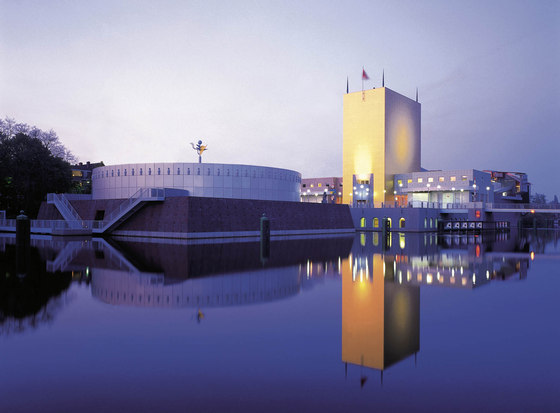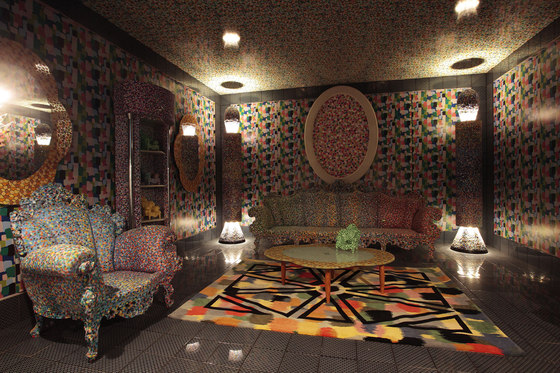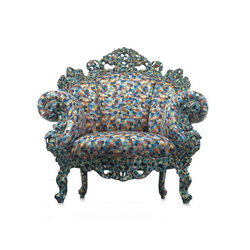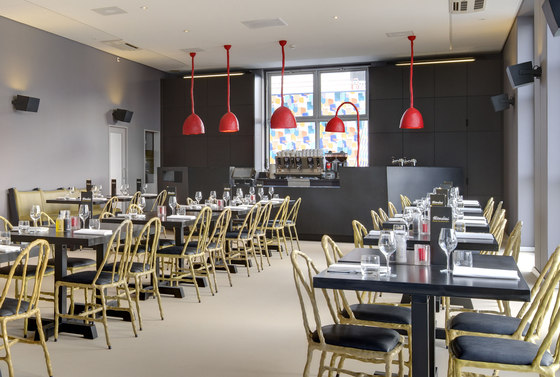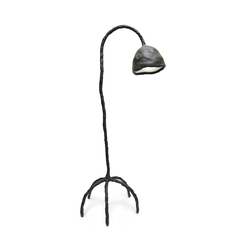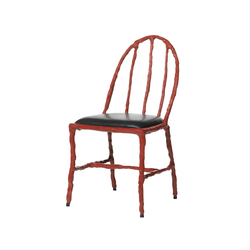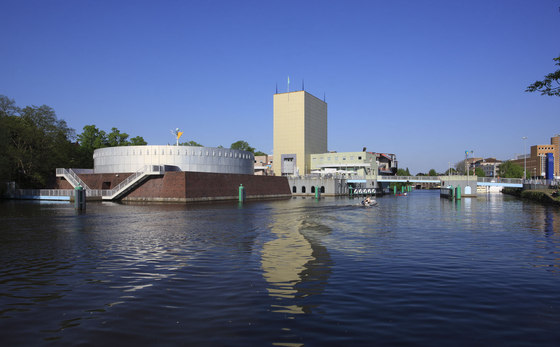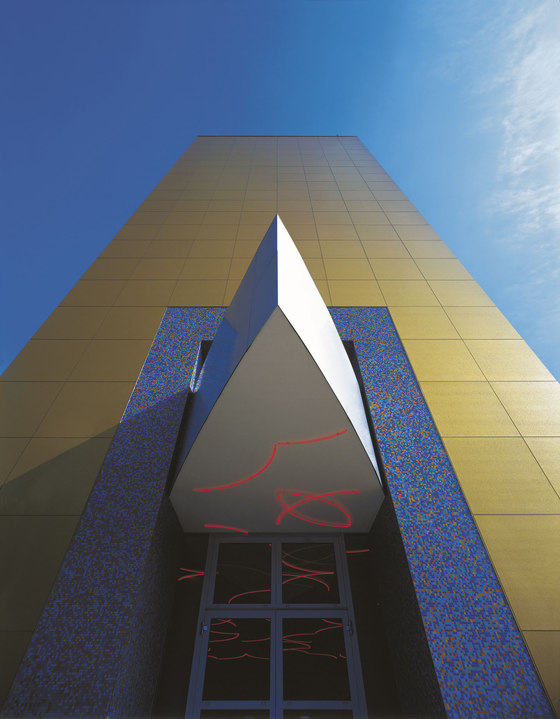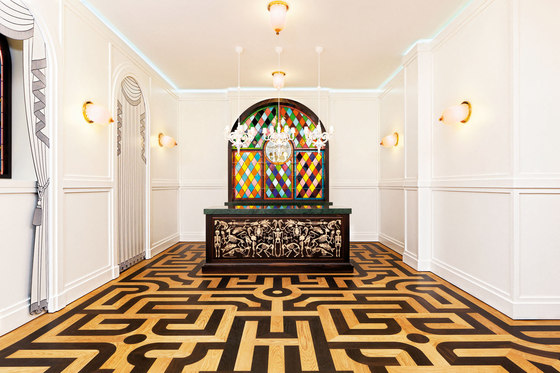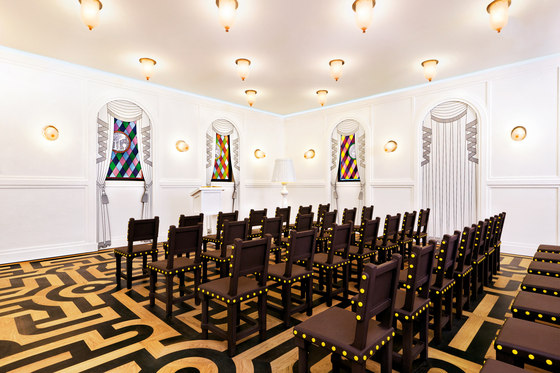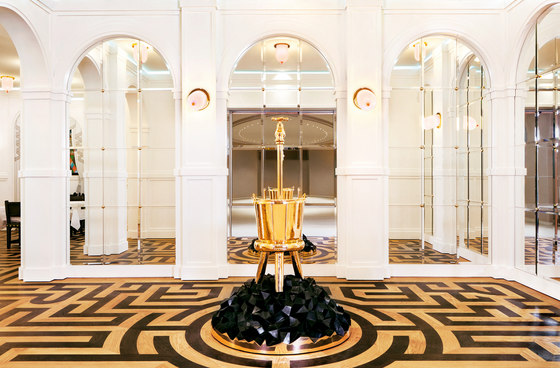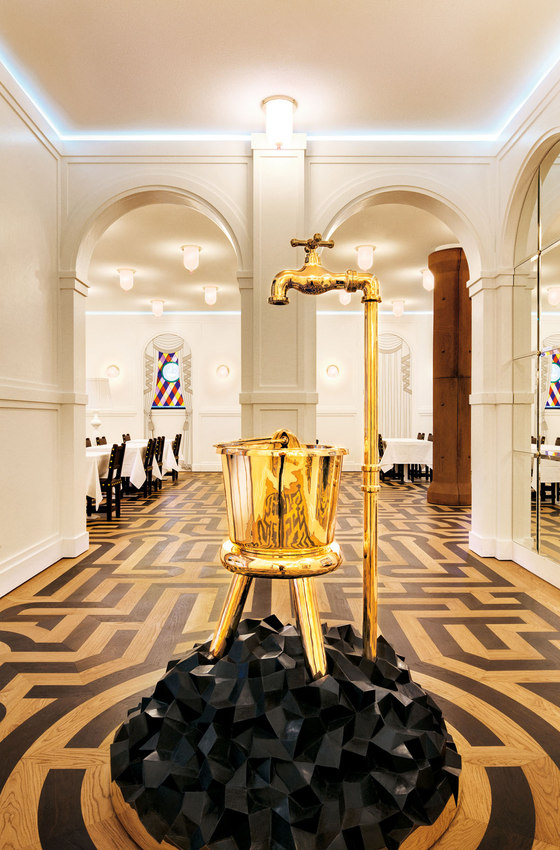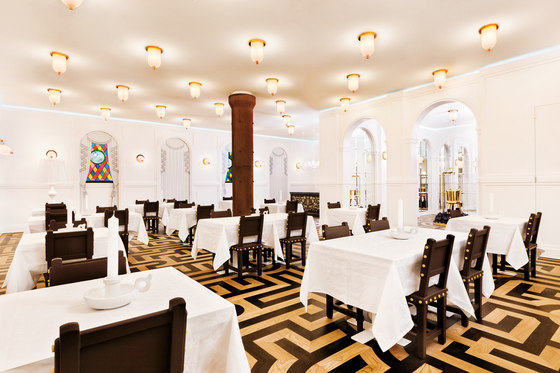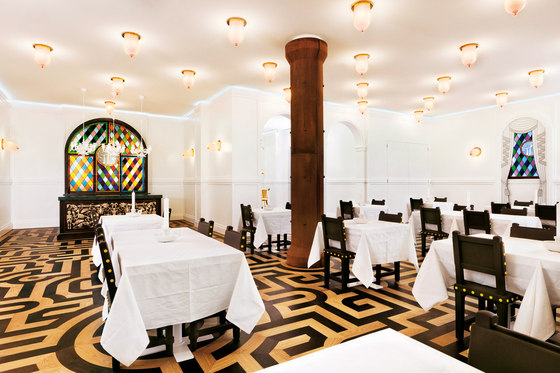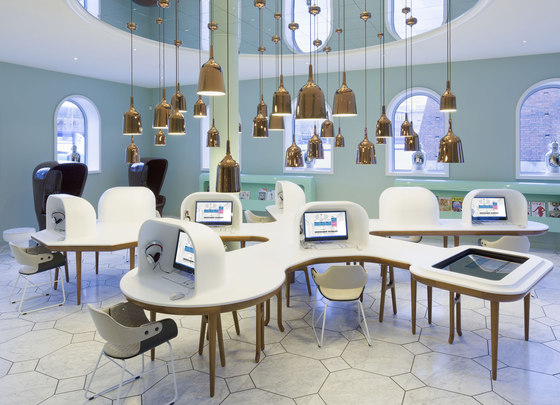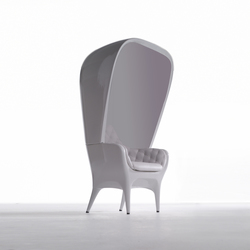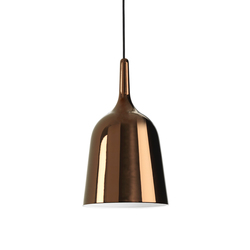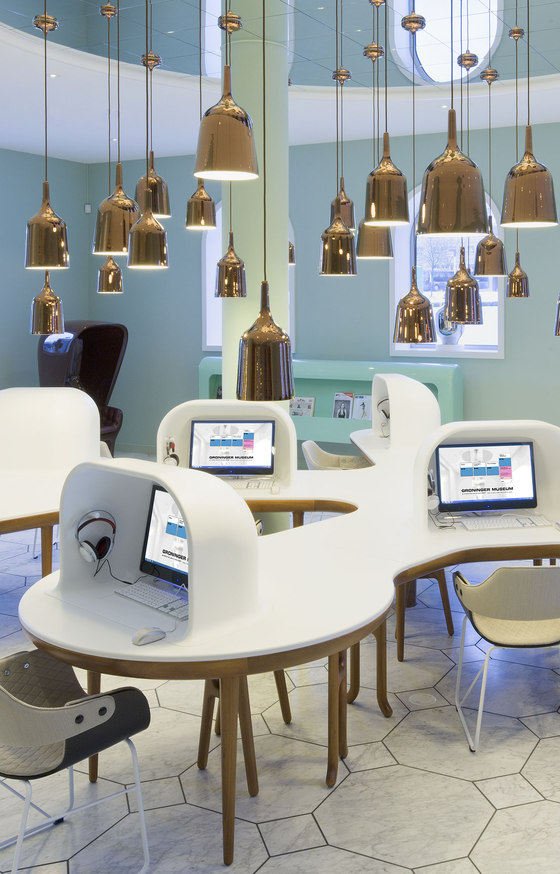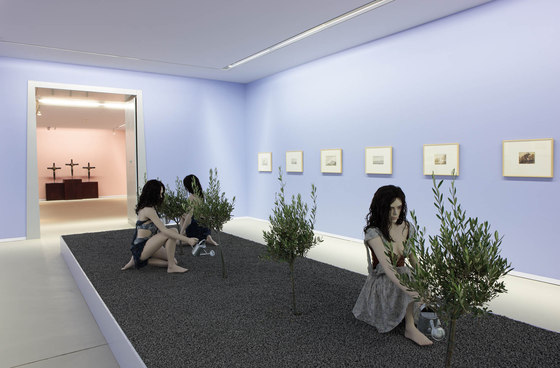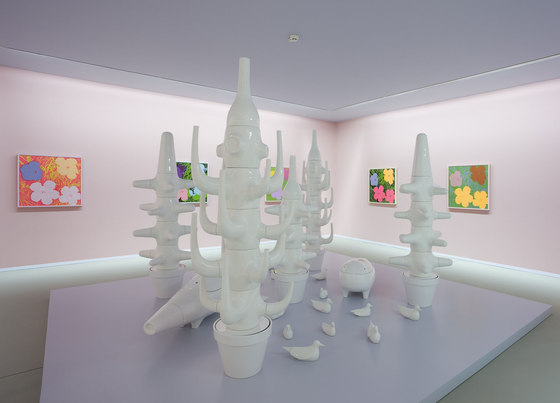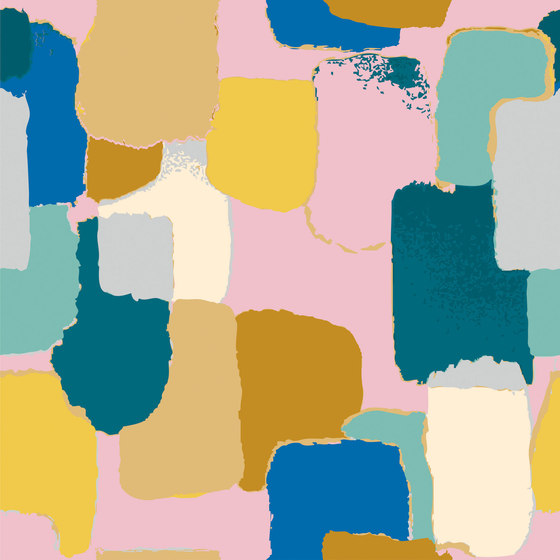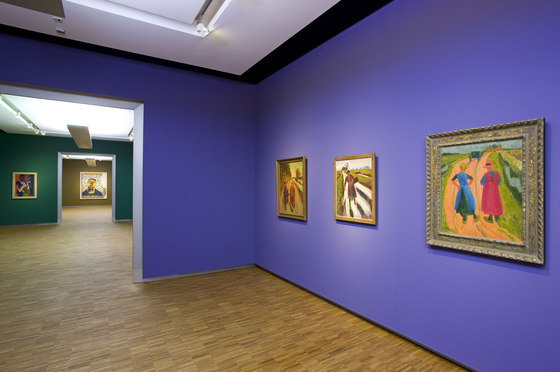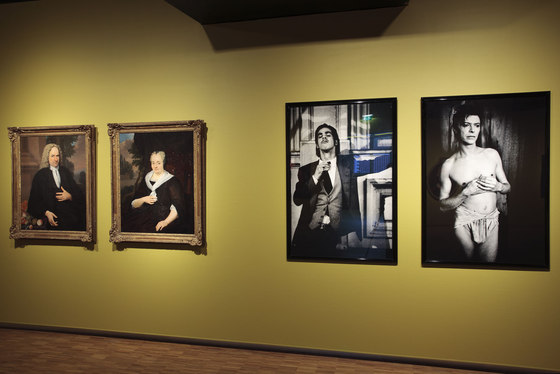Proustmotief – designer Alessandro Mendini
Mendini Restaurant - designer Maarten Baas
After a renovation project which took over 8 months, the Groninger Museum will reopen its doors to the public on Sunday 19 December. The entire building has regained its original lustre and and its colours have been fully restored. Several rooms have been thoroughly renovated by the top designers Maarten Baas, Studio Job and Jaime Hayon. They designed, respectively, the Mendini Restaurant, the Job Lounge and the Info Center, the ultramodern digital visitors’ information centre.
Interior
The Groninger Museum can hold its own with other top museums in the Netherlands and Western Europe. To hold this position requires constant innovation and improvement. As a starting point for their spectacular new design of the reception hall Job Lounge, Studio Job took the typical 19th-century private gentlemen’s clubs, frequented by their characteristic members, all smoking and wearing top hats. The Info Center, the new visitors’ information centre, was designed by the young Spanish artist Jaime Hayon, whose work has featured worldwide in the major art and design publications. The Mendini Restaurant on the museum’s premises was refurnished by Maarten Baas, who derived his inspiration from his Clay collection. The furniture objects in this collection have a metal frame and are made of industrial clay. Baas designed a series of new Clay models especially for the Mendini Restaurant. They are entirely handmade.
Exterior
During the revitalization project, the museum’s exterior underwent major repairs. The golden tower has regained its original splendour and the colours of the pavilions have been freshened up. The new tiles on the exterior of the Mendini Pavilion were designed by Alessandro Mendini himself. These durable ceramic tiles were made by the world-renowned ceramics factory Koninklijke Tichelaar Makkum. After the operation, the whole building radiates a new, fresh charisma.
Layout of Mendini Restaurant
The new design in the Mendini Restaurant is based on the furniture series called Clay, created by Studio Maarten Baas. The furniture is made of synthetic clay with a metal skeleton. All models are hand-made and thus unique. The Dutch designer Maarten Baas started his study at the Design Academy Eindhoven in 1996, and his first design, the Knuckle candleholder, was taken into production during this study period. In 2002, he designed a series of burnt furniture, Smoke, which has been added to the collection of the Groninger Museum.
Job Lounge
The lounge created by Studio Job for the Groninger Museum is a showpiece in itself.
The design duo of Job Smeets (1970) and Nynke Tynagel (1977) was inspired by 19th-century private clubs full of smoking gentlemen in top hats. These were once sophisticated bastions with thick-pile carpets on creaking wooden floors; chandeliers were suspended from richly decorated ceilings supported by solid pillars. The muffled silence was only broken by the calming spatter of the fountain at the entrance. It was an ivory tower for the elite – just as it was on the Titanic. It is not without reason that this world has vanished.
This gaudy gentility has been re-endorsed by Studio Job, with the use of iconic interior elements made of refined materials and produced by the best craftspeople. But this time, the use is ironic. In this creative process, Studio Job is not reticent about quoting from its own work. The fountain is made of cast bronze. The polychrome leaded-glass windows display stained glass representations. The bar is equipped with wooden marquetry. The glass wall lamps and ceiling lights were manufactured by the famous Venini glass company in Murano. It is an excessive luxury that is seldom seen these days. A relic from a bygone age.
But, as always, things are not quite what they seem in the realm of Job. The glass lamps have the form of a pert female breast. The fountain consists of a dripping tap above a large bucket. The gothic castle chairs, manufactured by Moooi, are casted of plastic and the thick curtains, manufactured by Exposize, are nothing more than a print upon photographic material. This clash between old, new, high, low – good and bad, if you like –has been taken by Studio Job to the limit. The pillar is made of rusty iron and the rosettes in the mirror room are engraved with hip hop smileys. The tablecloths are equipped with archetypical representations of prisons and camps. Anyone examining the leaded-glass window in Coco-the-Clown colours will see oil drilling rigs, fuming factory chimneys and other industrial excesses. The exclusive parquet floor is a confusing labyrinth.
Between the walls of the museum – of all places – mundane symbolism has been elevated to art, and beauty has been contaminated by banality. The neo-classicist interior forms a fremkörper even in Alessandro Mendini’s post-modernist building. Studio Job has created a gesammtkunstwerk in which fantasy and functionality mingle in a dream landscape that flouts all museological rules of good taste.
Jeroen Junte, design and art critic, October 2010
Gemeente Groningen (Local Council)
Provincie Groningen (County Council)
Samenwerkingsverband Noord Nederland (Cooperation Northern Netherlands)
Atelier Mendini - Exterior
Maarten Baas – Mendini Restaurant
Studio Job – Job Lounge
Jaime Hayon – Info Center
Execution
Revitalisation coordinator: Caspar Martens
Interior design: Mark Wilson
Main building contractor: Bouwgroep Dijkstra Draisma
Publicity: Josee Selbach, Willemien Bouwers
Chief Sponsor
The 2010 Groninger Museum Revitalisation received support from the WGC2006 Foundation (Stichting WGC2006), (World Gas Conference 2006), a collaboration between EnergieNed, GasTerra, Gasunie and KVGN
Funding Parties
Municipality of Groningen, Province of Groningen Northern Netherlands Provinces (SNN – Samenwerkingsverband Noord-Nederland)
Info Center – designer Jaime Hayon
Info Center – designer Jaime Hayon
Mendinipaviljoen – designer Alessandro Mendini
Mendinipaviljoen – designer Alessandro Mendini
New tile – designer Alessandro Mendini
Ploegpaviljoen - overview collection
Ploegpaviljoen - overview collection
